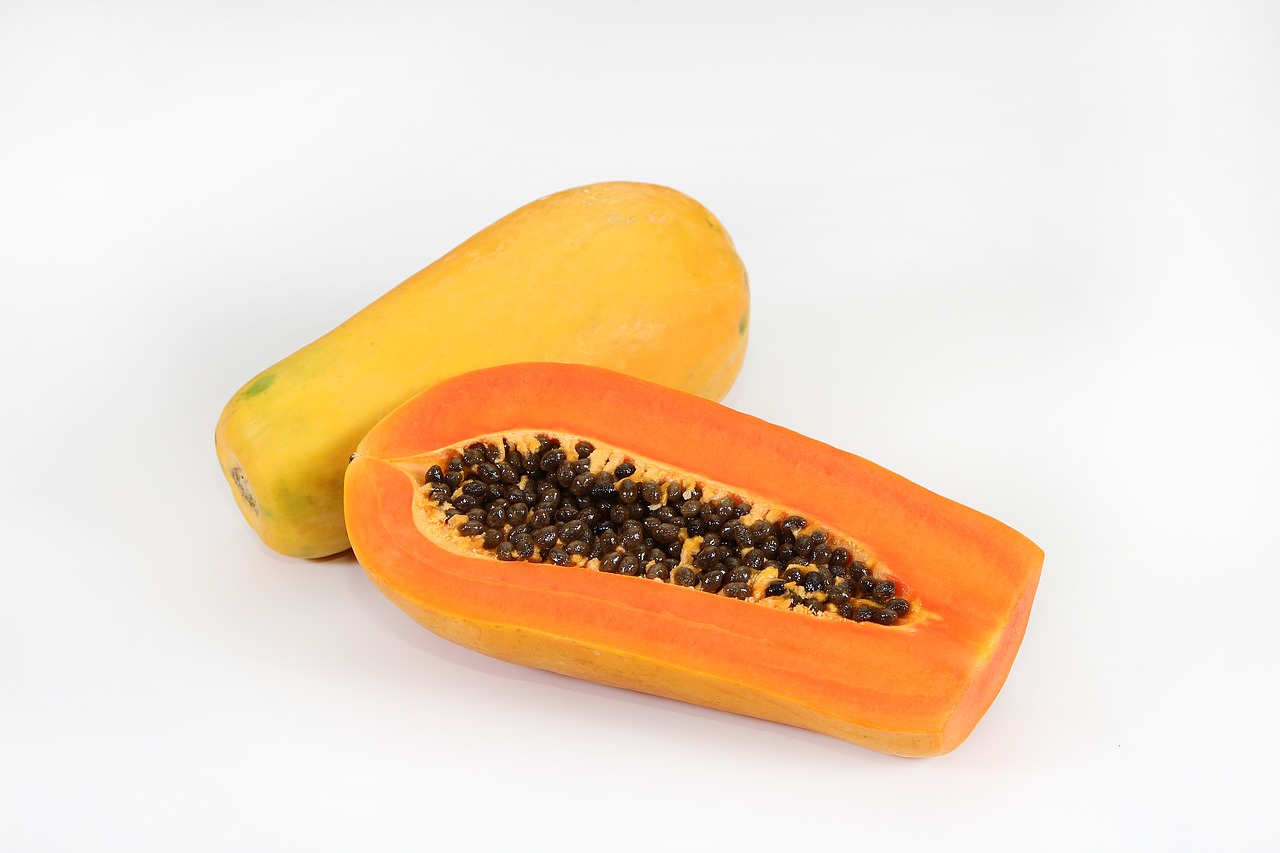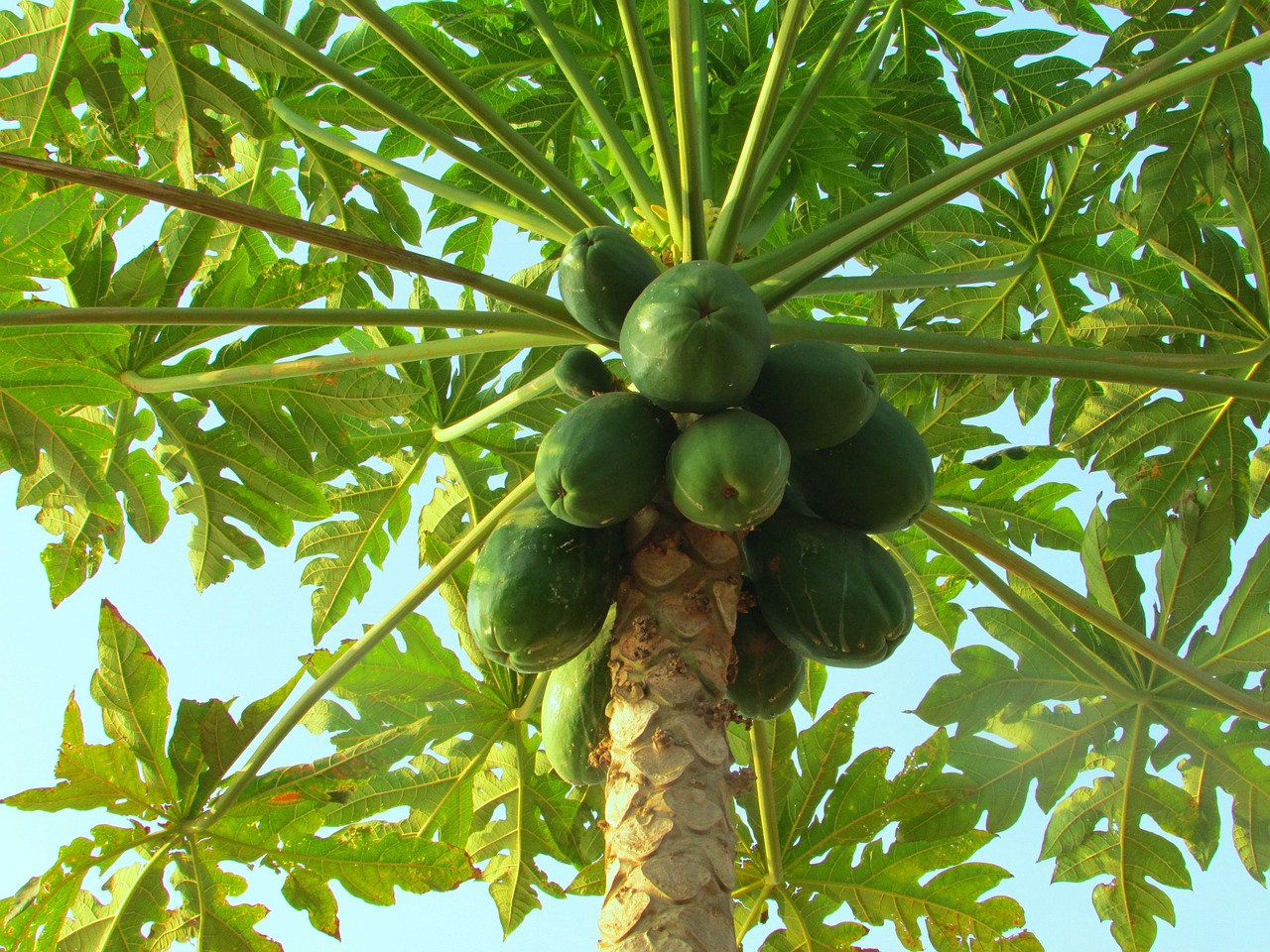
Papaya is a sparsely branched small green tree with a single trunk and grows up to 5-10 meters. Papaya leaves are arranged spirally and are usually confined to the upper part and small branches. The leaves of papaya are relatively broad; they have a diameter of 50-70cm and consist of seven lobes. Papaya has latex in all parts that are present in articulated laticifers.
The flowers of papaya are dimorphic and have five parts. In male flowers of papaya, the stamens are fused with pastels. In female papaya flowers, there is a superior ovary and five petals loosely attached to the base.
The fruit of Papaya is generally a spherical or cylindrical large berry. This berry has a length of 15-45 cm and a diameter of 10-30cm. A softer texture of the fruit is an indication of its ripening. A ripened fruit of papaya has an amber-orange hue.
Nutritional Constituents of Papaya
The raw form of papaya contains around 88% water. The carbohydrate content of papaya is only about 10%. On average, 275-gram medium-sized papaya includes 110-120 calories which are not too high. The low calories and low sugar content of Papaya make it a friendly diet for weight management.
Lets look at all the nutritional contents of Papaya in the following section.
1) Sugars
The carbohydrates found in papaya include sugar and fibres. The main sugar content of papaya consists of glucose, fructose, and sucrose; other sugars have less quantity in papaya. Papaya contains a balanced amount of these sugars. The overall sugar content in medium-sized 275-gram papaya is around 20 grams.
2) Fiber
Fibres are an essential item to include in a healthy diet plan; they are required for maintaining gastrointestinal tract mobility and digestion. Intake of fibre diet is significant for preventing the onset of chronic diseases. A medium-sized papaya contains around 5 grams of fibre, which fulfils 15-20% of your daily fibre requirement.
3) Proteins
The protein content of Papaya is less than the requirement of the human body. It contains only 0.5-0.8% protein which cannot fulfil the extensive tissue regeneration and metabolism.
4) Vitamins and Minerals
Like all other fruits and vegetables, papaya is rich in vitamins and minerals. Papaya contains 200% vitamin C, more than the daily vitamin C needs of the body. Papaya also contains vitamin A and folate. These vitamins found in papaya have several health benefits, which we will discuss ahead.
The minerals that are exceptionally high in papaya include potassium, magnesium and copper. The presence of these vitamins has many cardiovascular and other health benefits. Apart from these essential vitamins and minerals, papaya also contains minute quantities of other minerals and vitamins.
5) Fats
The fat content of Papaya is very low. It contains less than 0.1% fats, making it a perfect recipe for people who want to reduce their fat intake.
Health Benefits of Papaya
Papaya is among one of the most beneficial fruits for health. Papaya reduces the risk of heart diseases, controls inflammation, lowers cancer risk, and improves digestion.
A detailed description of all the health benefits of papaya is in the following section.
1) Protection against Heart Diseases
Papaya has an exceptionally high amount of antioxidant vitamins, i.e. vitamin A, vitamin C, and vitamin E. A high amount of antioxidant vitamins in papaya reduces the risk of heart pathologies. The antioxidant property of Papaya prevents the oxidation of cholesterol.
The reduced oxidation of cholesterol reduced the risk of atherosclerosis and subsequent heart disease. Because it is the oxidized form of cholesterol that mainly form plaques and lodges in the blood vessels. Folic acid found in Papaya also reduces the risk of heart diseases by causing the conversion of homocysteine into less harmful amino acids.
Additional, the high fibre content of Papaya also makes it protective for the heart. The high fibre content reduces the reuptake of bile acids from the gastrointestinal tract. Reduced reuptake of bile acids increases the requirement of de novo synthesis of bile acids. Additional cholesterol is utilized in the de novo synthesis of the bile acids, which lowers the blood cholesterol level.
2) Improved Digestion
Papaya contains an enzyme named papain which helps in protein digestion. The fibres present in papaya also improve gastrointestinal mobility and overall functioning. According to the research results, people who take papaya or its supplements daily for forty days; have significant improvement in constipation and bloating. The seeds, leaves and roots of papaya are also used as a home remedy for treating gastrointestinal ulcers.
3) Control of Inflammatory Disease
The generation of the oxidative free radicals at the site of injury and inflammation causes further progression of the inflammation. The tissue damage caused by inflammation is also mediated by the oxygen-free radicals.
Papaya contains several antioxidant vitamins, i.e. vitamin C, vitamin A, and vitamin E. It also contains carotenoids which have antioxidant effects. The antioxidant compounds of Papaya neutralize the oxygen-free radicals. This neutralization of oxygen free radicals slows down the progression of inflammation and tissue damage.
4) Anticancer Properties
Research studies indicate that lycopene found in papaya reduces the risk of cancer. Papaya has also been shown to fasten the recovery from cancer when added to other treatments. The anti-cancer effect of papaya is probably due to its antioxidant property. However, papaya also has unique effects because all the antioxidant fruits do not have an anti-cancer effect. The intake of papaya is particularly beneficial for the prevention and treatment of prostate cancer.
5) Protection against Skin and Hair Damage
The composition of papaya makes it especially beneficial for the protection of skin. Wrinkling and other skin problems caused by oxidative damage can be avoided by papaya. Two elements found in papaya that are specifically beneficial for skin include vitamin C and lycopene. A supplementation of lycopene can reduce sunburns after prolonged exposure to sunlight. Papaya is also great for hair because of the vitamins present in it.
6) Asthma Prevention
Studies show that people who have a high intake of papaya are at less risk of asthma. The reduced risk of asthma by papaya intake is due to the presence of beta carotene in it. Other natural sources of beta carotene include apricots, pumpkin, broccoli, cantaloupe, and carrots.
7) Bone Health
Low intake of vitamin K reduces bone durability and increases the risk of bone fractures. Papaya contains some amount of vitamin K along with other vitamins, which increases bone strength. Vitamin K increases calcium absorption from GIT and reduces its excretion from the kidneys. Increased uptake and reduced excretion of vitamin K increase calcium deposition in the bones.
8) Blood Glucose Control
Papaya has a few calories, and its sugar content is relatively low. Additionally, it has a significant amount of fibre. A low-calorie intake with increased fibre intake improves blood glucose control. The intake of papaya is beneficial for both type 1 and type 2 diabetes.
9) Strengthening of Immune System
Intake of papaya optimizes the functioning of the immune system and reduces the risk of bacterial and viral infections. Papaya contains a significant amount of vitamin C. Vitamin D increases the proliferation and differentiation of white blood cells. It also contains vitamin A, another essential for a functional immune system.
10) Eye Health
The intake of papaya is generally good for eye health, but it is particularly important in preventing diabetic nephropathy. In general, papaya contains vitamin A which is necessary for the production of eye pigments. A deficiency of vitamin A leads to night blindness, and severe deficiency leads to absolute blindness.
The vitamin A present in Papaya prevents this age-related vitamin A deficiency and subsequent eye effects. In patients with diabetes, intake of papaya keeps the blood glucose level in control which subsequently reduces the risk of diabetic nephropathy.
11) Pregnancy-Related Benefits
Papaya contains a limited number of calories and helps control blood glucose levels. A better blood glucose level prevents gestational diabetes. Papaya also contains vitamin A and folic acid. Folic acid is required in more quantity to make more RBCs to fulfil the blood need of the baby.
12) Slow Down Aging
The combined effect of intake of papaya is better health due to better blood glucose control and prevention of heart diseases. The vitamins and antioxidant properties of Papaya also prevent tissue damage due to ageing. The ultimate result is slowing down the wear and tear changes of the body. A regular intake of papaya makes a person look younger than his age.
The Takeaway Message
Papaya is a leafy green tree that grows in different parts of the world and has many health benefits. The fruit of Papaya is berry-like and contains a balanced amount of various nutrients. Papaya has a limited number of calories and a lower amount of sugar. It also contains some proteins and antioxidants.
Papaya is particularly rich in vitamins and minerals. The presence of antioxidants, vitamins and minerals makes papaya beneficial for health in many conditions. The intake of papaya is good for reducing the risk of heart disease and chronic inflammatory conditions.
The low sugar and high fibre content of Papaya make it particularly important for patients with diabetes. Papaya is also beneficial for preventing asthma and osteoporosis. Due to the presence of vitamins, papaya also has many pregnancy-related benefits. The overall result of regular papaya intake is improved health and slowing down ageing.
References:
1; Kong, Y. R., Jong, Y. X., Balakrishnan, M., Bok, Z. K., Weng, J., Tay, K. C., Goh, B. H., Ong, Y. S., Chan, K. G., Lee, L. H., & Khaw, K. Y. (2021). Beneficial Role of Carica papaya Extracts and Phytochemicals on Oxidative Stress and Related Diseases: A Mini Review. Biology, 10(4), 287. https://www.mdpi.com/2079-7737/10/4/287
2; Miller, C. D., & Robbins, R. C. (1937). The nutritive value of papaya. The Biochemical journal, 31(1), 1–11. https://portlandpress.com/biochemj/article-abstract/31/1/1/27837/The-nutritive-value-of-papaya1?redirectedFrom=fulltext
3: Nafiu, A. B., & Rahman, M. T. (2015). Anti-inflammatory and antioxidant properties of unripe papaya extract in an excision wound model. Pharmaceutical biology, 53(5), 662–671. https://www.tandfonline.com/doi/full/10.3109/13880209.2014.936470
4; Santana, L. F., Inada, A. C., Espirito Santo, B., Filiú, W., Pott, A., Alves, F. M., Guimarães, R., Freitas, K. C., & Hiane, P. A. (2019). Nutraceutical Potential of Carica papaya in Metabolic Syndrome. Nutrients, 11(7), 1608. https://www.mdpi.com/2072-6643/11/7/1608
5; Papaya. (2021). In Drugs and Lactation Database (LactMed). National Library of Medicine (US). https://pubmed.ncbi.nlm.nih.gov/30000941/
6; Maruthanila, V. L., Elancheran, R., & Mirunalini, S. (2020). Carica papaya leaves and cancer prevention: An overview. Mini reviews in medicinal chemistry, 10.2174/1389557520666200811102622. Advance online publication. https://www.eurekaselect.com/184755/article
7; Singh, S. P., Kumar, S., Mathan, S. V., Tomar, M. S., Singh, R. K., Verma, P. K., Kumar, A., Kumar, S., Singh, R. P., & Acharya, A. (2020). Therapeutic application of Carica papaya leaf extract in the management of human diseases. Daru : journal of Faculty of Pharmacy, Tehran University of Medical Sciences, 28(2), 735–744. https://link.springer.com/article/10.1007%2Fs40199-020-00348-7

